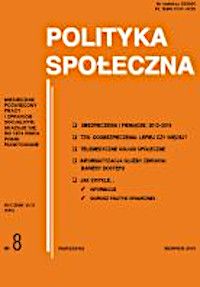
- Changes in expenditure on benefits from the social security system in the years 2012-2018 (1-8)
The article presents an analysis of selected financial aspects of FUS expenditure and other sources for cash benefits in 2012–2018, with particular emphasis on expenditure on retirement pensions (including bridging pensions) and annuities, pre-retirement allowances and benefits, social pensions and teacher compensation benefits, and short-term benefits related to sickness insurance
- Insurance in the social security system (8-17)
The considerations and research results presented in this study relate to the use of social security systems in the social security system, introducing private insurance protection to the social security system. Social insurance consists in the preferential treatment of expenses incurred for supplementary insurance protection, which is to increase social security provided by the social security system. The article presents the theoretical assumptions of the idea of social security and arguments for introducing appropriate solutions referring to given categories of social risks. It is assumed that social security is a social good, not a pure public good, and therefore its provision should be financed to some extent from private funds. As a rule, public funding must clearly dominate in the financing of the social security system. However, the possibility of appropriate involvement of private funds in ensuring social security should be considered, which can be expected above all from better-off households. Against this background, based on the results of qualitative and quantitative research, attention is drawn to the possible interest in financial preferences that would encourage households to take advantage of additional insurance. By disseminating solutions in which family households are also to strive for an adequate level of social security, care must be taken to shape awareness of social risk and insurance foresight, but also to ensure effective social communication in this area. This would allow to gain the desired social acceptance (or at least social approval) for the gradual introduction of the idea of social security to the social security system.
- Telemedicine solutions in social services (17-24)
The article discusses the possible advantages of telemedicine solutions in care and rehabilitation. Based on statistical data and a literature review, it has been shown that telecare and tele-rehabilitation can improve people's well-being, especially in aging societies, and partially alleviate the problem of shortage of medical and care workers. In addition, technological, legal and other barriers to the wider implementation of telemedicine were discussed. Finally, several examples of successful implementation of remotely provided treatment and rehabilitation implemented or tested in Poland are described.
- Digital exclusion in healthcare from the perspective of patients and medical staff (24-29)
Digital exclusion is a phenomenon that can be found in various areas of socio-economic life. Health protection is one of them, and this phenomenon often affects both patients and medical staff. The article presents selected aspects related to this issue. These include, in particular, the analysis of the causes of exclusion, the characteristics of groups at risk of digital exclusion, an analysis of the effects of this digital exclusion, examples of good practice, and ways to counteract this phenomenon. In addition, the benefits and risks of digital inclusion as well as selected formal and legal regulations were discussed.
- Perception of foundations supporting the sick or disabled (30-36)
The dynamic increase in the number of foundations, the dissemination of 1% tax transfers to public benefit organizations, and many divergent opinions appearing in the media on topics related to helping oblige to undertake current analysis in this field. The purpose of the article is to examine the attitude and activity of the Polish society to help others, analyze whether the degree of trust in the foundation affects the active attitude of society to help the needy and attempt to assess whether the place of residence and the level of wealth affect the perception of the foundation and help the sick and the disabled. In the quantitative research, the study group consisted of 213 randomly selected respondents. The surveyed units were defined by means of targeted selection from 9 cities located in different parts of Poland. The survey contained 40 questions of various types, and the study was conducted using the CAPI research method using a mobile device (tablet). A series of statistical tests was carried out to check the relationship between questions, thanks to which research goals were achieved. The study showed no connection between the perception of foundations supporting sick or disabled people and the place of residence as well as the level of wealth in the hypothesis. Examining the attitude and activity of the society to help the needy provided detailed knowledge in this area. Respondents' answers showed that the majority of respondents would like to support those in need. He also indicates as a necessary need to change the organization of the support system for the sick or disabled. The degree of trust in the foundation affects the active attitude to help.
Polityka Społeczna (Social Policy) - full list







